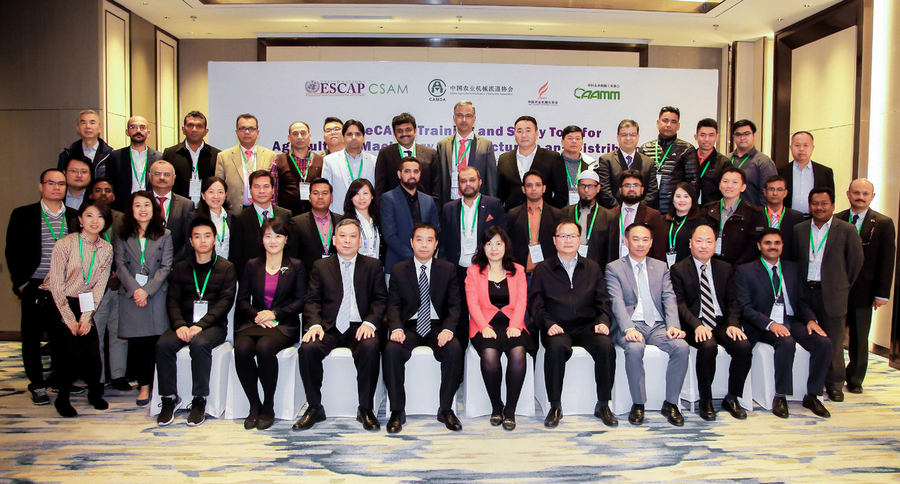CSAM Network Enhances Regional Cooperation amongst Agricultural Machinery Associations

The 5th Training and Study Tour for Agricultural Machinery Manufacturers and Distributors of the Regional Council of Agricultural Machinery Associations in Asia and the Pacific (ReCAMA), wrapped up successfully on 2nd November 2019 in Qingdao, China.
The event was organized by the Centre for Sustainable Agricultural Mechanization (CSAM) of the United Nations Economic and Social Commission for Asia and the Pacific (ESCAP), together with the China Agricultural Machinery Distribution Association, China Agricultural Mechanization Association, and China Association of Agricultural Machinery Manufacturers from 29 October to 2 November in Qingdao.
The 5th ReCAMA Training and Study Tour focused on climate-smart mechanization, whole value chain mechanization and horticulture mechanization in response to the demand expressed by network members. It included classroom lectures, group discussion, and a visit to the China International Agricultural Machinery Exhibition (CIAME) 2019 as well as CSAM’s pilot project site on integrated straw management in Laixi, a cooperative applying whole process mechanization of Chinese scallions in Pingdu, and some relevant enterprises. The event gathered more than 37 representatives from member agricultural machinery associations of RECAMA from 11 countries to facilitate dialogue, information exchange and regional trade.
At the opening of event, Dr. Li Yutong, Head of CSAM said, “We at CSAM firmly believe in putting partnerships at the core of our work. We are pleased to join hands with governments, universities, the private sector, civil society and other United Nations entities to enhance the scale and impact of programmes to promote sustainable agricultural mechanization in the Asia-Pacific region, thus contributing towards the 2030 Agenda for Sustainable Development.”
At the closing session, participants discussed about the needs and priorities of ReCAMA in the next five years, highlighting the thematic areas of smallholder-focused, climate-smart, post-harvest, and smart mechanization among others. They also outlined potential regional cooperation methods to address these priorities such as enhanced platforms and mechanisms for networking, information/experience exchange, technology transfer, tailored capacity building and business matching events. The results of the discussion are expected to provide guidance for the future development of ReCAMA.
Dr. Qu Sixi, Country Director of the World Food Programme (WFP) China Office, and Mr. Zhang Zhongjun, Assistant Representative of the Food and Agriculture Organization of the United Nations (FAO) China Office also attended the event and addressed the gathering at the Opening session.
